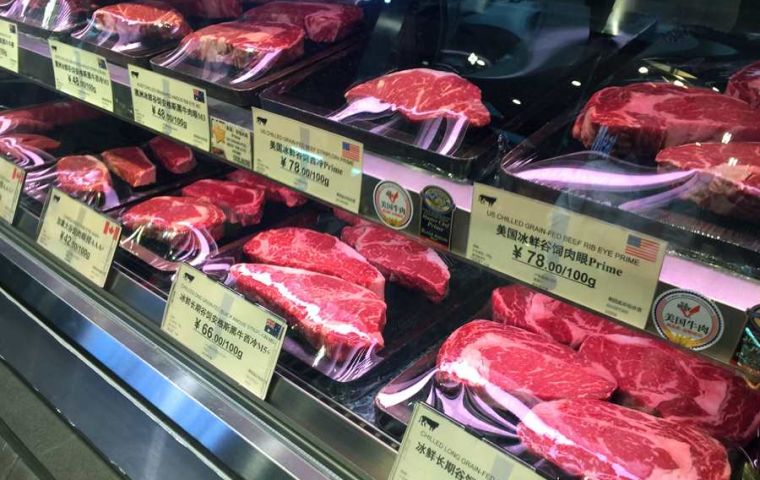MercoPress. South Atlantic News Agency
China lifts ban on Brazilian beef, but UK and EU retailers will stop purchases because of deforestation
 Orlando Ribeiro from the Brazil's Ministry of Agriculture stated resumption is “total” and “without additional conditions”
Orlando Ribeiro from the Brazil's Ministry of Agriculture stated resumption is “total” and “without additional conditions” Good and bad news for Brazil's beef exports. China finally lifted the ban on Brazilian beef and allowed the resumption of shipments to the great Asian market. But several of the main retailers in Britain and the European Union have announced the banning of Brazilian beef in their shelves because meat processors are using cattle linked to the Amazon and Pantanal deforestation.
China's ban lifted on Wednesday lasted since 4 September when two atypical cases of mad cow disease were reported in the states of Minas Gerais and Matto Grosso. Chinese Customs informed the Brazilian government that shipments of boneless beef products from cattle under 30 months of age, are again allowed in the market.
The secretary of Commerce and International Relations from the Brazilian Ministry of Agriculture, Orlando Ribeiro, stated that the resumption is “total” and “without additional conditions”. Ribeiro added that “everything certified after December 15th will be accepted”
However environmental NGOs from Brazil and the US, (Mighty Earth) have been tracking Brazilian beef from the cleared rain forest in the Amazon basin and the swampy Pantanal to European supermarkets such as Sainsbury in UK, Carrefour and Albert Heijn in Belgium and Lidl in Netherlands, some of them as premium cuts such as jerked beef and even tinned meat, corned beef..
Allegedly the transgressions involve indirect suppliers of cattle, with farmers breeding, then selling them off to fatteners and finally to the abattoirs of such companies as JBS, Marfrig and Minerva, the leading exporters of South American beef. The details are included in an explosive report, which has also called the attention of Metro retailers in Germany.
On Tuesday, Agriculture Minister Tereza Cristina had anticipated that Brazil had already passed on all technical information to China, but could not advance any forecast for lifting the embargo, which lasted more than three months.
The ban had an immediate impact on Brazilian ranchers and cattle prices, since China is the main customer and had been absorbing around 60% of Brazilian sales abroad. Earlier this month, the Chinese authorized the entry of cargoes sent before the embargo was imposed, benefitting an estimated 100,000 tons stranded in different ports..
Brazil voluntarily suspended exports to China after identifying two cases of mad cow disease in the country. The World Organization for Animal Health (OIE) recognized that these were atypical episodes and that the risk to the national herd was negligible. Several technical meetings between Brasília and Beijing were held since then.
But the problem with UK and EU retailers could be far more challenging, since some of the supermarket chains have already decided to stop buying Brazilian beef and sub-products.
Niko Muzi head of Mighty Earth Europe said that major decisions by European markets follow on meat processors “undelivered promises and little results”. Brazilian meat processors admit that indirect suppliers of cattle are the main obstacle for greater transparency.
JBS and Marfrig have attempted new tracking systems and tools to improve the traceability of cattle, but with not much effect. Anyhow JBS reiterated it does not forgive or tolerate any lack of disrespect for the environment, indigenous communities or Brazilian legislation, and insisted that all cattle suppliers complied with the company's protocols.
Marfrig also underlined it complies with all social and environmental criteria, and that the indirect suppliers named in the NGOs report, are not registered in the company's list. .




Top Comments
Disclaimer & comment rules-

-

Read all commentsThe elephant has started to eat and the fly is choking.
Dec 19th, 2021 - 02:08 pm 0Environmental and sanitary objections are nothing more than a convenient tool to exercise free trade restrictions that favor entrenched and crony business interests.
Dec 22nd, 2021 - 04:30 pm 0Commenting for this story is now closed.
If you have a Facebook account, become a fan and comment on our Facebook Page!